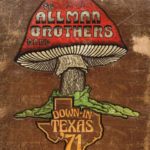For The Allman Brothers Band, 1971 will be noted forever as the year of its most majestic and influential live album- At Fillmore East– and its most tragic day- the accidental death on October 29 of their musical and spiritual leader, Duane Allman. The group, itself, was only two years into existence at this point, and thanks to a vigorous and relentless tour schedule, was performing at an exhilaratingly high level. This latest archival set from the band’s own record label is drawn from a September 28th Austin Municipal Auditorium show just three weeks ahead of Allman’s final bow.
The positives, and there are several, start with the band’s playing. In short, the ensemble was smoking good. Six months earlier the Brothers had torched the Fillmore, resulting in the Tom Dowd-produced live masterwork. The momentum of that record’s release, not to mention the group’s ascending individual and collective talent, carried them into the Lone Star State as a band on fire.
Throughout, Duane’s guitar work is brimming with confidence and daring; his slide wailing and prodding, dirty and clean, mirroring his brother Gregg’s distressed howl or countering and complimenting Dickey Betts’ blistering charms. It’s all very crisp and energetic; Gregg bashing the bluesboy piano keys, stride for stride with his sibling on “Done Somebody Wrong,” or, on B-3, buttressing Duane’s proto-metal detour in “You Don’t Love Me.”
Betts is right there, too, gliding across the fretboard with speed, dexterity, and taste, while Berry Oakley thunders on bass, pushing the drumming duo of Butch Trucks and Jaimoe to push right back. And even within a songlist loaded with familiar entries of the era, their improvisations and nuances develop numerous in-the-moment ecstasies of phrasing and emotion. If only it was better captured.
Which leads to the less than positive quibbles of this single-disc release (filled-in and culminating with a cool, lengthy Houston radio interview segment with Duane and Oakley). The fidelity, cleaned up as well as possible, still sounds like a great bootleg, which is essentially what it is. And the intermittent appearances of hornman Juicy Carter, who Dowd conspicuously left off of the Fillmore album, vacillates between exotic shading at best to distracting dissonance at worst. The sonic balance leans towards guitars-and-Gregg; not a deal-breaker in and of itself, but sits overall in a mix that’s a bit muddy. And the “In Memory of Elizabeth Reed” is regretfully incomplete, (though praise is deserved for a fairly clean edit of what’s there.)
Yet, sum it up this way: Duane, after “Stormy Monday,” says, “That’s the blues, good as we can play them.” Hard to argue with Skydog on that, and even harder to resist adding this one to the collection.



No Comments comments associated with this post